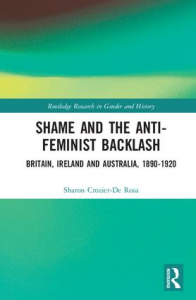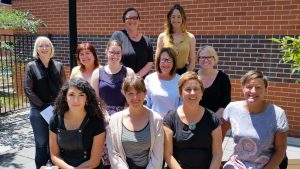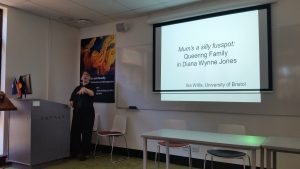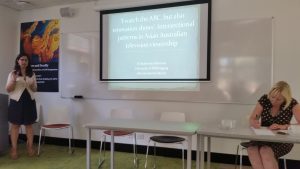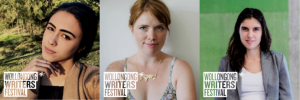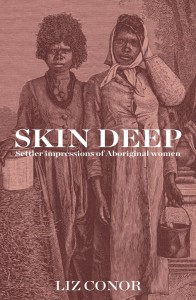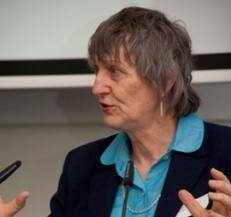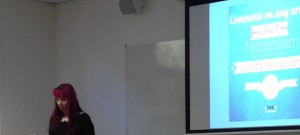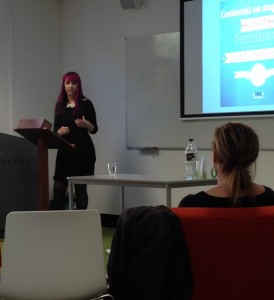*Growing up in the Troubles, where men were often absent, led me to research women policing women.
*Being a diasporic Irish historian led me to write a book that connects Irish women’s ideas and activisms to those of women across the globe.
Sharon Crozier-De Rosa reflects on her recent book launch which was supported by FRN, Center for Colonial and Settler Studies & Center for Critical Human Rights Research UOW.
In March 2018 my book, Shame and the Anti-Feminist Backlash: Britain, Ireland and Australia, 1890-1920 (2018, Routledge), was launched by visiting academic to the University of Wollongong, Associate Professor Jane Haggis (Flinders University).

ASSOCIATE PROFESSOR JANE HAGGIS LAUNCHING SHAME AND THE ANTI-FEMINIST BACKLASH AT THE UNIVERSITY OF WOLLONGONG.
Associate Professor Haggis delivered a wonderfully generous appraisal of the book, emphasising its transnational methods and scope. The book, she said, ambitiously connected the histories of women in sites that did not, at first, appear to fit together – through the application of an emotions history framework. In making those comments, she also remarked on her discomfort with the concept of women using shame in a productive capacity – to police their own emotional and political communities.
In my brief response, I reflected on what motivated me to study the connections and the disparities between patriotic women’s uses of an emotion that is often viewed – and felt – with discomfort across very different sites along the British imperial spectrum. In doing so I connected two seemingly unconnected processes – my doctoral research on British anti-feminism and my upbringing during the Troubles in Ireland.

RESPONDING TO ASSOCIATE PROFESSOR HAGGIS’S COMMENTS.
First, Marie Corelli.
As I read through her works to complete my PhD on bestselling fiction and a history of women’s emotions, I could not help but be disturbed by the glaring anti-feminist sentiment infusing the novels of one extraordinarily successful woman writer that I was looking at – Marie Corelli.

MARIE CORELLI (1855-1924). APPLETON’S MAGAZINE, C. 1904. PHOTOGRAPH BY F. ADRIAN. IMAGE VIA WIKIMEDIA COMMONS
From the 1880s to the 1910s, Corelli reigned as ‘Queen of the Bestsellers’, far outselling any fellow authors of her day. How did she approach feminism? On the one hand, she poked fun at the ridiculous appearance and habits of so-called New Women who aped the habits of men – bicycle riding, swearing, smoking, atheistic, loose sexual attitudes, like the comically manly Honoria Maggs in My Wonderful Wife (c.1886). On the other hand, Corelli’s treatment of women’s feminist aspirations revealed a much deeper, darker undercurrent of feminist hatred, or sometimes even a general hatred of women.
It cast light on a world where feminist shaming was an accepted and well-practised custom.
- There was a war against women, she said, but women were totally to blame for that.
- These women, she argued, were responsible for lowering the reputation of England which used to be the civiliser of the world.
The latent vitriol in Corelli’s writing surprised me. Here was a woman who was an independent and extraordinarily successful female writer who, by all accounts, was also an incredibly astute businesswoman. Her public life did not seem at odds with the demands of turn-of-the-century feminism.
More puzzling for me was the fact that a large proportion of her readers were women.
- Why were these 5-600 page novels, which were filled with blatant feminist hatred and feminist shaming – albeit while indulging in feminist transgressions – so attractive to her vast army of women readers?
- Why was women–shaming–women such a regular and familiar feature of late nineteenth- and early twentieth-century popular culture?
Women Shaming Women
In investigating a practice that I was uncomfortable with, I was mindful of a 1970s historian’s caution to not disrespect the views of those who lost – those fighting against the vote – of not consigning them to history’s ‘rubbish heap’.
When I looked closer at women shaming women, I saw some of the nuances of their practices – here were women policing their own political communities in what was a highly patriarchal world.
Some picked up weapons to fight for their political views.
Suddenly it was all very familiar.
The Troubles
Growing up on a housing estate during the Troubles, where men were often absent – in prison or on the run – I was continually confronted with strong women policing their own communities of womanhood in what was a highly patriarchal society.
Some of these were women who picked up guns to fight for their political views. They were a visible presence as they marched in political parades, armed, uniformed.
Here were women’s practices aligning in what were two remarkably different societies:
- One an immensely powerful imperial centre in the early twentieth century.
- The other a fractured, disenfranchised anti-colonial site in the late twentieth century.
Yet both housed communities of womanhood – policing themselves using emotional tools and tactics – picking up arms in defence of their politics if need be.
That led to Shame and the Anti-Feminist Backlash, Britain, Ireland and Australia –
- An historical investigation of the reasons for women opposing feminism,
…and, more poignantly for me –
- A transnational history of women policing women using emotions – where I was able to connect the ideas and activisms of diverse groups of patriotic women across the globe.
Today: Anti-Feminism? Woman Hatred? Shaming?
Surely the voting in of a highly misogynistic man as US President and the backlash that process unleashed tells us that anti-feminism, woman hate and feminist shaming are not obsolete issues.
Philosopher Michael Morgan says that, today, most people think it is a shame that shame exists. Yet, if we look at that election, women, feminists included, shamed Hillary Clinton – and each other – across the globe – for everything from feminism to anti-feminism and everything else in between. In a highly patriarchal world, women policing their own political communities using emotions like shame is not dead – it is just a practice rooted in history.

Dedication
I dedicate this book to my mum and dad for the role they played in helping me get to this point where I can use our collective experiences – of conflict and of mobility – to teach and write about the intersections between gender, nationalism, emotions and violence, nationally and transnationally.


